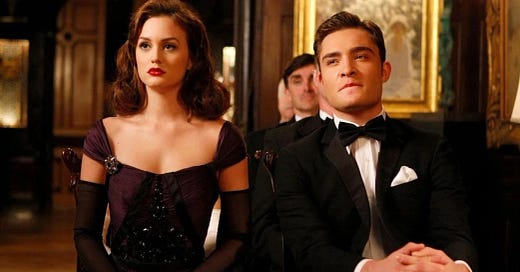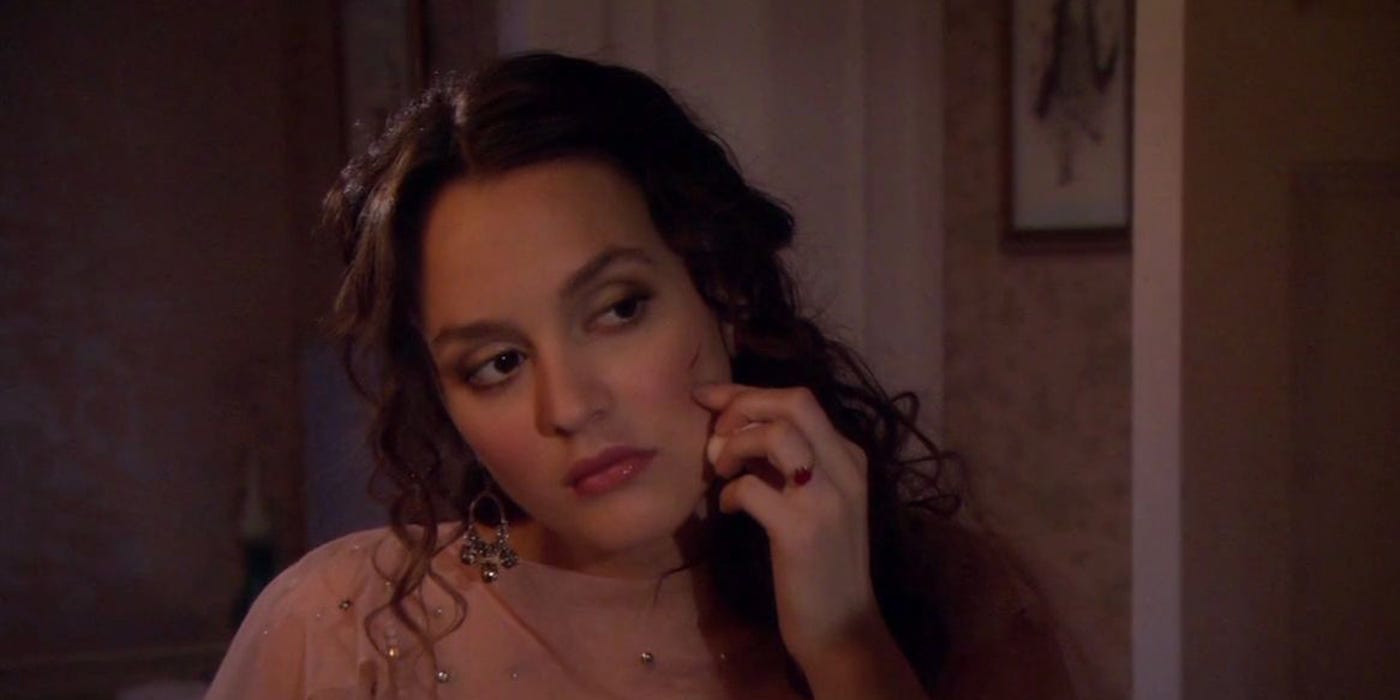Coming to Terms With Chuck and Blair
The relationship I idolized as a teenager was always toxic — I was just too young to understand what that meant
This essay is part of our Five Days of Gossip Girl series. If you’re not a GG fan, don’t worry; this will end on Friday. But if you are, make sure you tell your GG-loving friends to subscribe and tune in for an essay each day this week. This one comes with a trigger warning for abusive and toxic relationships, and mention of rape and sexual assault.
In junior high, when classmates were first starting to date — and by date I mean beg their parents to drop them off at the mall so they could hold hands while browsing Hot Topic and split an Auntie Anne’s pretzel — I was getting most of my cues into what romance might look like from the screen.
I’d watched The Princess Bride probably upwards of 20 times by then, the satire completely lost on me as I focused wholeheartedly on Wesley rolling down that hill yelling “as you wish.” I’d gotten incredibly mad at my father for not alerting me to Mark Ruffalo walking by us in Manhattan until five minutes later, despite Mart being my heartthrob of the moment thanks to 13 Going on 30. I also remember watching a lot of Unfabulous, learning the acoustic guitar so I could write songs like that one Addy sings about Jake Behari. (The one I’m thinking of in which she rhymes “Jake Behari” with “friend today, boyfriend tomorr-y” seems to have been scraped from the internet, so here’s another example.)
But no couple had more influence on my understanding of romance than Gossip Girl’s Chuck and Blair. The relationship between the ruthless but loyal queen bee and rich (even for GG standards) bad boy starts out in the back of a limo with Sum 41 blasting “With Me” — a song I would go on to make my ringtone and that would push me to say my favorite band was Sum 41 for years despite knowing at most five of their songs. It’s when Chuck is still an overtly despicable character (more on that later) and Blair is in an on-off relationship with Chuck’s best friend Nate. For better or worse, their messy love story would become the backbone of the series.
Chuck and Blair taught me all I thought I needed to know about love: it was challenging, dramatic and passionate to the point of pushing its two players to desperation.
Throughout the years, when I rewatched Gossip Girl, I rarely went through every episode in order. I would pick and choose, usually landing on those with Chuck and Blair’s best scenes. There were the rare happy moments between them, like when Chuck finally tells Blair those three words/eight letters she’s been asking for, or their wedding in the season finale. I’d gravitate towards the seasons when they were together, or at least doing a will-they-don’t-they, and not dating, in Uncle Jack’s words, “the blonde broad in London” or lonely boy.
While I tended to whiz by the most obviously terrible things Chuck did to Blair — trading her as some kind of sexual object to his uncle in exchange for a building being an obvious one — abuse was baked into their relationship from the start. When Chuck finally gets to be with Blair in season one, he loses interest quickly since she’s no longer a virgin. He then spills the secrets of her sex life to Gossip Girl while she’s dealing with a pregnancy scare. (By the time those episodes come around, the audience is apparently supposed to have forgotten that, in the pilot, Chuck attempts to rape Jenny and assaults Serena.)
And yet, as a teenager, those terrible choices were vaporized for me when Chuck did something kind for Blair, or when they finally found their way to one another after episodes of strife. Watching a toxic relationship on screen can, in some ways, reflect being in one: The highs are so high, you’re able to forget the lows. In your memories, you fast forward the darkness, repeating the thrill of the good times over and over and over.
But as an adult, even the happy scenes are a difficult rewatch, with the toxicity of Chuck’s seemingly good actions shining through the shiny exterior. There’s one storyline in which Blair seeks acceptance from her former high school’s popular crowd after failing to fit in with the “hipster” college students at NYU. When she wants to throw in the towel — as in, give up on making one person at NYU like her — Chuck “helps” by asking how she could do this to him. “I’m Chuck Bass and I told you I love you. You’re saying I’m easier to win over than a bunch of pseudo intellectual homesick malcontents. Would you really insult me like this?” he asks. “The next time you forget that you’re Blair Waldorf, remember I’m Chuck Bass and I love you.”
The scene ends with uplifting, romantic music and a kiss. But while I’m sure I swooned as a high schooler, it’s a sad representation of how, even during their good times, Chuck and Blair’s self worths were so twisted up in one another that if one of them shatters, so goes the other, and the moments of happiness and love we see are just an attempt to pick up their collective pieces. Within a co-dependent relationship, love and selfishness are indistinguishable.
I'd like to think my fully-developed brain no longer superimposes TV romance onto my real life relationships. But as a teen, one of my favorite scenes was when, after a fight, Blair finds Chuck in a desperate state of grief due to his father’s death. He looks at her pleadingly, his face etched with pain, and she immediately folds, as if she knows she’s the only one who can help him. This dynamic comes up again and again throughout the series, and each time I reveled in it. He needs her, and so she’s there — no matter what he’s put her through. It’s a dynamic I carried into one of my first serious relationships, and while I can’t blame that on Gossip Girl completely, it was certainly a factor.
Television has ingrained in us the notion that love and relationships aren’t interesting — or worth fighting for — without constant strife. Unlearning this is a slow process. Even though I can watch the show now knowing that Chuck and Blair’s romance is not all it was cracked up to be, I still can’t help but root for them. I select the episodes of Chair that make me the happiest, that are still toxic, but a manageable chaos. Yet recently a scene I hadn’t seen in years came up on one of my social media feeds. It was one I hardly remembered, one I’d blocked out.
The scene starts in Chuck’s penthouse, with Blair in a shimmery jacket looking already distraught with what’s about to happen. She tells Chuck someone else asked her to marry him. “You would never marry anyone else,” Chuck responds. “You’re mine.” He then tries to force himself on her and when she tells him it’s over between them, he punches the glass window just behind her head. The glass shatters and scrapes her face. Bleeding, she flees.
Watching, my stomach squirmed. I’ll usually watch any episode of GG that my algorithm dishes up, but this one I wished I’d scrolled passed. By the time the scene had found its way to my Instagram feed, I already knew that the relationship I’d put on a pedestal for years was actually quite grim, but it was not something I’d ever fully reckoned with. In much the same way we tend to compartmentalize the knowledge of off-screen misbehavior to enjoy the shows we love, I had pushed any deeper understanding of Chuck and Blair’s love story to the back of mind. Now, the possessiveness and violence was on full display. It was impossible to ignore.
In 2011, the show’s co-creator Josh Schwartz tried to answer for the violence depicted in the penthouse scene in an interview with E News:
The way we viewed it, I think it's very clear that Blair is not afraid in those moments, for herself. They have a volatile relationship, they always have, but I do not believe — or I should say we do not believe — that it is abuse when it's the two of them. Chuck does not try to hurt Blair. He punches the glass because he has rage, but he has never, and will never, hurt Blair. He knows it and she knows it, and I feel it's very important to know that she is not scared — if anything, she is scared for Chuck — and what he might do to himself, but she is never afraid of what he might do to her.
In the face of someone taking their anger out on something just inches from her head — or during any of their turbulent relationship — it’s hard to believe that Blair was never afraid for herself. But if she were truly not afraid, is that much better? In toxic relationships, we use all sorts of tricks to mold ourselves into someone who is not fearful, even when we should be. Her perceived lack of fear is a product of the abuse, not evidence against it.
But Schwartz’s words confirm not only that Chuck and Blair were toxic, but also that the show was written in a way that positions that toxicity as normal, as not abuse. Sometimes, we can watch horrible things play out on screen somewhat comfortably, because it’s clear the creator isn't endorsing or normalizing the behavior. But knowing Schwartz was complicit makes it even harder to watch. It’s clear he holds Chuck and Blair's relationship up as a one-for-the-ages love story.
Resisting that narrative as a viewer isn't easy. There’s one episode of Gossip Girl I continue to return to, despite having come to terms with Chair and learned as an adult to separate them completely from what a healthy, safe, happy relationship should look like. It’s when Chuck and Blair sneak away in the days before she’s set to marry someone else, the somewhat finality of their relationship giving them the freedom to enjoy one last moment together. They crash a Bar mitzvah and “Rolling in the Deep” plays while they dance, laugh, clutch one another and kiss, beaming as they do something reckless, but as one. In an on-off toxic relationship, it’s often the in-between — the precipice of saying goodbye or moment before reuniting — that feels most exhilarating. Your relationship is shrouded in disapproval by people who actually care about you, but you’re making a choice out of what feels like passion, what disguises itself as love. As Adele croons “we could have had it all” and Chuck and Blair are thrusted into the air on chairs, their fervor beats through the screen.
When the moment dies, it’s time for them to finally let one another go.
“This is your chance at happiness,” Chuck tells Blair about her upcoming marriage to another man. “You think you shouldn't want it because you’ve never had it and it scares you.”
He says she deserves her fairytale, and his goodbye is the most selfless he’s ever been. If only it had lasted.
Don’t forget reply to this email with a Gossip Girl moment you just can’t stop thinking about. It can be as big as Chuck buying a burlesque club at age 16 or as small as Serena wearing her graduation tassel in her hair instead of a cap. We’ll compile these all for a Friday post. And catch up on yesterday’s post here about which characters deserved better and worse.






